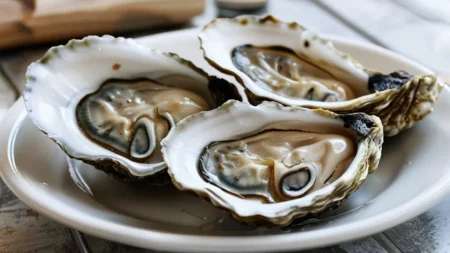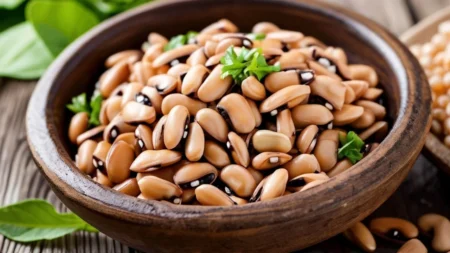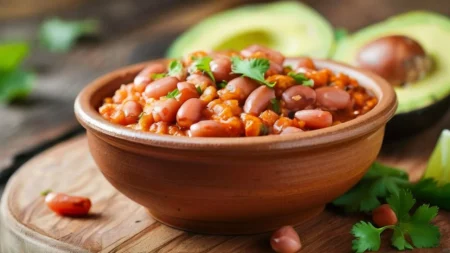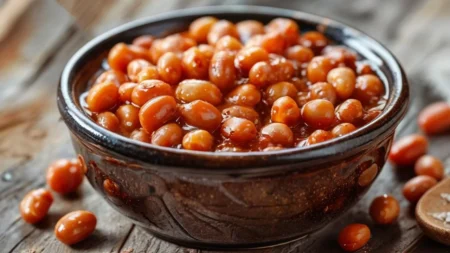This article will guide you through crafting a balanced healthy diet plan that emphasizes weight loss meal plans designed specifically for the summer. We will delve into the components of an effective diet, the importance of creating a balanced diet, and provide a sample weekly meal plan for weight loss. Additionally, combining exercise and fitness strategies with overcoming the common challenges faced during weight loss, rounded off with expert tips and advice, will ensure your summer diet plan is both successful and sustainable.
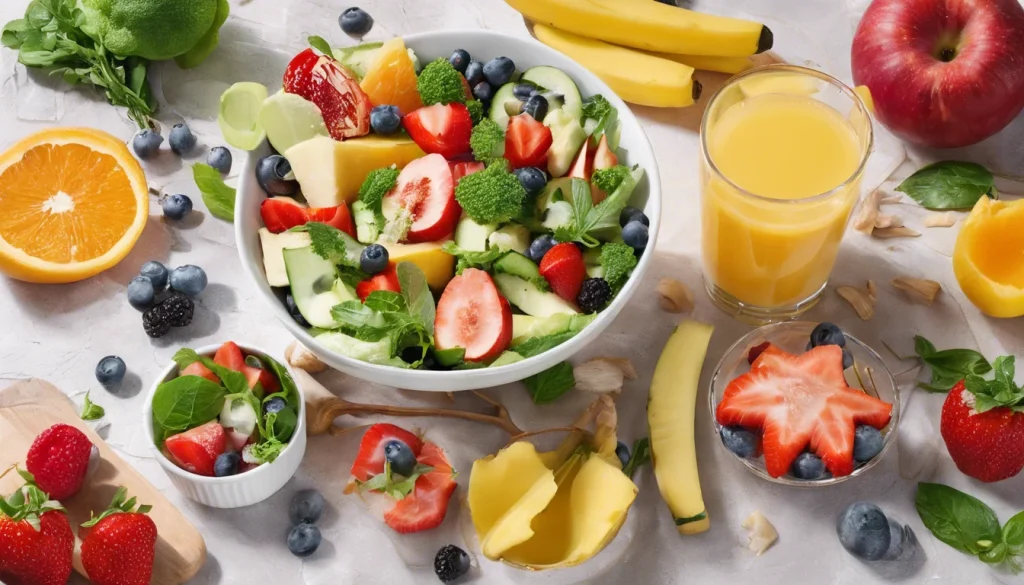
Components of an Effective Summer Diet Plan
Importance of Hydration
Staying hydrated is crucial, especially during the hot summer months. Approximately 60% of your body is made up of water, which plays a vital role in regulating body temperature, supporting brain function, mood, and keeping joints lubricated [1]. It’s essential to drink between ½ ounce to 1 ounce of water per pound of body weight daily, adjusting for factors like heat, humidity, and physical activity [1]. For those engaging in outdoor activities or sports, increasing fluid intake is necessary to replace the water lost through sweat [2]. Remember, mild dehydration can impair your physical performance and cognitive functions, so keep a water bottle handy and drink regularly throughout the day [2].
Benefits of Seasonal Produce
Incorporating seasonal produce into your diet not only enhances the flavor and nutritional value of your meals but also supports sustainable eating habits. Seasonal fruits and vegetables are picked at their peak; they are fresher and packed with vitamins, minerals, and antioxidants, which are crucial for health and well-being [3]. Eating seasonally also means these items are often less expensive and have traveled shorter distances to reach your plate, reducing your carbon footprint [3]. High in fiber, seasonal produce can help you feel fuller longer, aiding in weight management and promoting digestive health [3].
Lean Protein Sources
Protein is an essential component of a summer weight loss diet plan. It helps build and repair tissues, supports immune function, and can keep you feeling full longer, which is beneficial for weight management [4]. Incorporate lean meats like chicken and turkey, which are excellent sources of high-quality protein [5]. Seafood, particularly fatty fish rich in omega-3 fatty acids, is another great option. Plant-based proteins such as legumes and nuts are also important; they offer not only protein but also fiber, which is beneficial for digestive health [4]. Aim for a balanced intake that includes a variety of protein sources to support your dietary needs throughout the summer [6].
Creating a Balanced Diet
Daily Caloric Intake
Your daily calorie needs depend on various factors including age, sex, and activity level. For most women, a minimum of 1,600 calories is necessary to maintain weight, while men may require at least 2,000 calories. If weight loss is your goal, reducing your daily intake is essential, but it should be adjusted carefully to avoid consuming too few calories which can lead to poor body function and health deterioration. Harvard Health Publications recommends that women should not consume less than 1,200 calories and men not less than 1,500 calories per day unless supervised by a doctor [7].
Essential Nutrients
A balanced diet requires a mix of macronutrients and micronutrients to maintain health and support weight loss. Macronutrients include carbohydrates, proteins, and fats which provide energy and support bodily functions. Micronutrients, such as vitamins and minerals, support metabolism and cellular processes. For example, magnesium is crucial for metabolic processes and helps reduce insulin resistance, a common challenge in weight management [8]. Similarly, adequate intake of vitamin D is linked to reduced risk of obesity and helps in maintaining proper body function [8].
Balanced Meal Plans
Creating a meal plan that accommodates your caloric needs and includes a variety of nutrients is key to a successful diet. Plan your meals to include a balance of protein, fats, and carbohydrates, along with essential vitamins and minerals. Include foods that increase the rate of calorie burn, such as lean meats, whole grains, and certain spices like cinnamon and ginger [7]. Additionally, consider incorporating meal plans that are easy to follow and prepare, such as the 1,200 and 1,500 calorie plans that cater to different energy needs and promote satiety [9]. Planning ahead and shopping with a list can also help maintain a balanced diet by reducing impulsive eating and ensuring you have the necessary ingredients for healthy meals [9].
Sample Weekly Meal Plan
Day 1: Meals and Recipes
Start your week with a nutritious and comforting Slow-Cooker Chicken & Vegetable Noodle Soup. This dish fits perfectly into the Mediterranean diet with its abundance of vegetables, lean chicken breast, and whole-wheat pasta. Complement it with a fresh salad and toasted whole-grain bread for a complete, healthy dinner [10].
Day 2: Meals and Recipes
For day two, enjoy a creative twist on a classic with the Spaghetti Squash Lasagna with Broccolini. This low-carb meal combines garlicky broccolini, spaghetti squash, and cheese baked right in the squash shells for a delightful presentation. Serve this with a hearty Caesar salad and some warm, crusty whole-grain bread to round out your meal [10].
Day 3: Meals and Recipes
On the third day, indulge in the flavors of the Mediterranean with the Feta & Roasted Red Pepper Stuffed Chicken Breast. This recipe features a mix of feta cheese, roasted peppers, and spinach, all stuffed into a chicken breast. Brown the chicken in a skillet before baking to achieve a beautifully golden exterior while ensuring it cooks evenly throughout. Pair this main dish with a side of steamed vegetables or a Greek salad for a satisfying dinner [10].
Exercise and Fitness Strategies
Combining Diet and Exercise
To achieve optimal weight loss results during the summer, combining a healthy diet with an effective exercise regimen is crucial. Studies have shown that weight loss is significantly greater when diet and physical activity are combined, compared to focusing on diet alone [11]. For instance, a study found that combined behavioral weight management programs resulted in a weight loss of up to 6.29 kg over 12 to 18 months, emphasizing the effectiveness of integrating both diet and exercise in your routine [11].
Best Summer Workouts
The ideal summer workout plan should include a variety of exercises that target endurance, strength, balance, and flexibility. Incorporating high-intensity interval training (HIIT) along with strength training can maximize calorie burn and enhance muscle sculpting. It’s recommended to engage in up to 150 minutes of moderate-intensity aerobic activity per week, complemented by strength training sessions [12]. For those looking to maintain interest and motivation, varying the types of HIIT cardio exercises can be beneficial, ensuring progressive challenges to your body [13].
Tracking Your Progress
Maintaining a workout log or using fitness apps to track your exercise regimen is essential for monitoring your progress and staying motivated. Regularly reviewing your exercise routine helps you make necessary adjustments and stay committed to your fitness goals. It’s also important to ensure proper recovery by incorporating rest days into your workout plan, which is vital for preventing overtraining and injuries [13]. Remember, consistency in your workouts, coupled with a balanced diet, is key to achieving and maintaining your desired summer body [13].
Overcoming Challenges
Everyday stressors and unexpected events can often derail your summer diet plan for weight loss. Developing effective coping strategies and planning ahead for potential setbacks are crucial in maintaining motivation and achieving your weight loss goals.
Dealing with Cravings
Cravings are a common challenge in weight loss, often triggered by stress, hunger, or simply being in the presence of tempting foods. To manage these effectively, consider incorporating more protein into your meals, which can help reduce the urge to snack by making you feel fuller for longer [14]. Also, staying hydrated can sometimes curb cravings, as thirst is often mistaken for hunger [14]. If cravings hit, try engaging in a distraction like a brisk walk or a relaxing shower to help shift your focus [14].
Staying Motivated
Keeping your motivation high is essential for long-term success in your weight loss journey. Setting clear, achievable goals (SMART goals) and reminding yourself of the reasons why you started can keep your spirits high [15]. Keeping a weight loss journal can also be beneficial; it allows you to track your progress and reflect on your journey, helping maintain a positive and motivated mindset [16]. Celebrate small victories along the way to keep your enthusiasm alive [15].
Making Healthy Choices on the Go
Eating healthy while busy or traveling poses its own set of challenges. Planning is key—prepare healthy snacks and meals in advance to avoid making impulsive food choices [17]. Utilizing meal planning apps can help organize your meals for the week and keep track of nutritional intake [17]. When dining out, opt for healthier menu options and control portion sizes to stay within your diet plan [18].
By anticipating these challenges and having strategies in place to deal with them, you can stay on track with your summer diet plan for weight loss, ensuring that you not only reach but also maintain your health goals.
Expert Tips and Advice
Nutritionist Recommendations
To ensure your summer diet plan is both effective and sustainable, consider these expert recommendations. First, avoid being overly restrictive with your diet as this can lead to unsustainable habits and potential health risks [19]. Instead, focus on understanding your body’s caloric needs through mathematical calculations rather than arbitrary restrictions [19]. Incorporate plenty of fiber and water to aid digestion, especially during the hotter months when digestion can slow down [19]. Also, ensure your diet includes a balanced intake of proteins and fats, which are essential for fueling your body [19]. Remember, carbohydrates are not your enemy; they are a major energy source needed for proper body functioning [19].
Success Stories
Drawing inspiration from success stories can be incredibly motivating. For instance, individuals who have integrated regular, healthy meals and managed to make lifestyle changes rather than temporary diets tend to achieve and maintain their weight loss goals. Success stories often highlight the importance of setting realistic goals, like focusing on losing a manageable amount of weight at a time, which encourages persistence and long-term commitment [20].
Common Mistakes to Avoid
During your summer weight loss journey, be wary of common dietary mistakes. Not drinking enough water can lead to dehydration, which can cause fatigue and other health issues [21]. Avoid sugary beverages, which are high in calories and can contribute to weight gain [21]. Skipping meals can disrupt your metabolism, so opt for lighter, more frequent meals instead [21]. Overindulging in summer treats like ice cream should be done cautiously; opt for healthier alternatives like fruit sorbets or yogurt-based popsicles [21]. Lastly, heavy meals can make you feel sluggish; choose lighter, easier-to-digest meals to keep your energy levels up [21].
Conclusion
As we’ve navigated through the principles of a successful summer diet plan for weight loss, incorporating the key components of hydration, lean proteins, and seasonal produce has shown to be fundamental. The synergy of a balanced diet peppered with an adequate mix of macronutrients and micronutrients, alongside a thoughtful weekly meal plan has illustrated a practical roadmap towards achieving and maintaining a healthier physique during the warmer months. Emphasizing the importance of combining diet with exercise underscores the holistic approach necessary for sustainable weight loss and overall health improvement.
The journey towards weight loss is multifaceted, facing potential challenges such as managing cravings, staying motivated, and making health-conscious decisions on the go. By applying the expert tips and strategies discussed, including avoiding common pitfalls and drawing inspiration from success stories, you are better equipped to navigate these hurdles. As each individual’s body responds differently to diet and exercise, embracing a flexible and balanced approach, tailored to personal needs and goals, is essential for a successful and healthy summer weight loss journey.
FAQs
1. What are some summer foods that can aid in weight loss?
Consuming lemon water, fresh coconut water, buttermilk, and water-rich fruits such as watermelon, cantaloupe, and berries can be beneficial for weight loss. Additionally, staying hydrated by drinking sufficient water may also help in breaking down fats, as supported by research findings.
2. Which diet is most effective for losing weight while maintaining health?
There are several diets known for their effectiveness in weight loss and health benefits. Popular options include the Mediterranean diet, WW (Weight Watchers), the MIND diet, the DASH diet, intermittent fasting, plant-based diets, low-carb diets, the Mayo Clinic Diet, and the Volumetrics diet.
3. What are effective strategies for losing weight during the summer?
Here are five simple strategies for summer weight loss:
- Consume fewer calories without obsessing over exact numbers.
- Opt for healthier food choices.
- Increase physical activity.
- Drink more water.
- Modify your eating habits to be more mindful and structured.
Consistently applying these methods can lead to healthy weight loss.
4. How can I lose 20 pounds in two weeks?
To aim for such a significant weight loss in a short period, focus on eating a calorie-restricted diet rich in fruits, vegetables, and high-fiber foods. Minimize the consumption of processed foods and those high in carbohydrates, such as cookies, chips, and soda.
References
[1] – https://www.uclahealth.org/news/article/how-to-stay-hydrated-in-the-summer-heat
[2] – https://www.inspirahealthnetwork.org/news/beat-heat-importance-staying-hydrated-throughout-summer
[3] – https://blog.healthiapp.com/article/the-benefits-of-eating-seasonally-for-your-health-and-weight-loss/
[4] – https://www.eatingwell.com/article/8049141/high-protein-meal-plan-for-summer/
[5] – https://www.eatingwell.com/article/2053490/high-protein-flat-belly-diet-meal-plan/
[6] – https://listonic.com/meal-plans/en/summer-meal-plan-for-high-protein
[7] – https://www.calculator.net/calorie-calculator.html
[8] – https://www.eatingwell.com/article/7833555/top-nutrients-for-weight-loss/
[9] – https://www.eatingwell.com/article/7894307/simple-30-day-weight-loss-meal-plan-for-summer/
[10] – https://www.eatingwell.com/gallery/2061937/30-day-weight-loss-dinner-plan/
[11] – https://www.ncbi.nlm.nih.gov/pmc/articles/PMC4180002/
[12] – https://www.olivaclinic.com/blog/4-week-summer-workout-plan-weight-loss/
[13] – https://betterme.world/articles/summer-workout-plan/
[14] – https://www.healthline.com/nutrition/11-ways-to-stop-food-cravings
[15] – https://www.livewelldorset.co.uk/faq/lose-weight/how-to-stay-motivated-when-losing-weight/
[16] – https://goforward.com/blog/weight-loss/9-ways-to-get-and-stay-motivated-to-lose-weight
[17] – https://diabetes.org/food-nutrition/eating-healthy/tips-eating-healthy-on-go
[18] – https://extension.umn.edu/physical-activity/healthy-and-fit-go-eating-road
[19] – https://www.today.com/health/diet-fitness/summer-diet-mistakes-to-avoid-rcna80630
[20] – https://people.com/health/incredible-weight-loss-transformation-photos/
[21] – https://www.onlymyhealth.com/common-dietary-mistakes-to-avoid-in-summer-1713950274






